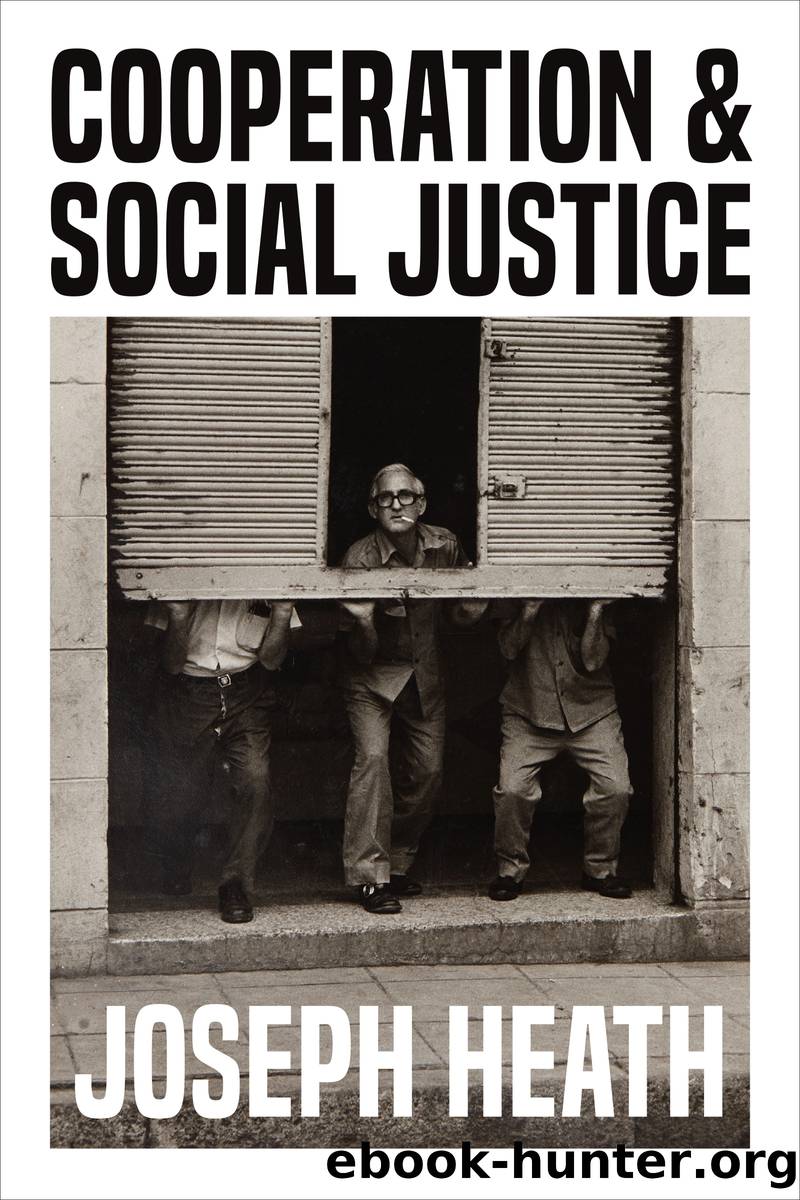Cooperation and Social Justice by Joseph Heath

Author:Joseph Heath
Language: eng
Format: epub
Tags: LCSH: Social justice, LCSH: Cooperation, LCSH: Equality
Publisher: University of Toronto Press
What Dalrymple is obviously eliding in this passage is the distinction between harm to others and harm to self. It is somewhat dramatic, but certainly not an abuse of terms, to describe making choices that will foreseeably lead to the misery and suffering of oneâs own children as âevil.â But what about bringing suffering upon oneself? Most of the behaviour patterns that Dalrymple is lamenting among the underclass are primarily self-destructive, not actively harmful to others (âpublic drunkenness, drug-taking, teenage pregnancy, venereal disease, hooliganism, criminalityâ34). They almost all involve failures of self-control. Calling these âevilâ is one way of explaining why they should be punished, or stigmatized, but there is a serious question as to whether they merit that description. Why is it âevil,â and not merely âtragicâ?
It should, of course, be acknowledged that the failure to draw a moral distinction between harm to self and harm to others is a long-standing feature of the Christian tradition. Of the âseven deadly sins,â for instance, sloth and gluttony are listed alongside wrath and greed, despite the fact that the former are self-regarding, the latter other-regarding. Much of this is due to the influence of classical Greek morality, where the ideal of âself-masteryâ was considered central to the ethical life.35 Many of the medieval catalogues of sin were just Christianized versions of Aristotleâs table of virtues and vices â a table that listed rashness and intemperance as vices, alongside more evidently other-regarding traits. Furthermore, Aristotelian virtue theory is a moral framework that encourages stigmatization, precisely because of the way that it categorizes actions as right or wrong only through reference to character traits (i.e., the âvirtuesâ or âvicesâ) of the individual who performs them. In this view, bad actions are the sort of thing that bad people do, not the other way around. Thus the generalization from a specific sanction to the ascription of some impairment of the person, which is the hallmark of stigmatization, is actually the recommended form of moral reasoning within the Aristotelian system. Despite the Christian injunction to âhate the sin, not the sinner,â much of this Greek ethos was absorbed into Christian ethics. The result is a framework that encourages significant moral disapproval of the character of individuals who suffer from self-control failure.
This is what I suspect is going on in Dalrympleâs thinking. At certain points, he claims that the misery he sees all around him is a consequence of declining belief in an objective order of values. (âLife in the British slums demonstrates what happens when the population at large, and the authorities as well, lose all faith in a hierarchy of values.â)36 And indeed, in order to make his argument, such an objective order of values is what he requires. To make the case that the behaviour of the heroin addict is âevil,â and thus deserving of punishment, he must say that drug abuse is intrinsically wrong, above and beyond whatever impact the addictâs choices have upon anyoneâs welfare, including his own. Drug abuse is a vice, vice is evil, and evil deserves to be punished.
Download
This site does not store any files on its server. We only index and link to content provided by other sites. Please contact the content providers to delete copyright contents if any and email us, we'll remove relevant links or contents immediately.
The remains of the day by Kazuo Ishiguro(8999)
Tools of Titans by Timothy Ferriss(8396)
Giovanni's Room by James Baldwin(7346)
The Black Swan by Nassim Nicholas Taleb(7129)
Inner Engineering: A Yogi's Guide to Joy by Sadhguru(6796)
The Way of Zen by Alan W. Watts(6614)
The Power of Now: A Guide to Spiritual Enlightenment by Eckhart Tolle(5782)
Asking the Right Questions: A Guide to Critical Thinking by M. Neil Browne & Stuart M. Keeley(5775)
The Six Wives Of Henry VIII (WOMEN IN HISTORY) by Fraser Antonia(5515)
Astrophysics for People in a Hurry by Neil DeGrasse Tyson(5190)
Housekeeping by Marilynne Robinson(4447)
12 Rules for Life by Jordan B. Peterson(4304)
Ikigai by Héctor García & Francesc Miralles(4274)
Double Down (Diary of a Wimpy Kid Book 11) by Jeff Kinney(4272)
The Ethical Slut by Janet W. Hardy(4253)
Skin in the Game by Nassim Nicholas Taleb(4249)
The Art of Happiness by The Dalai Lama(4130)
Skin in the Game: Hidden Asymmetries in Daily Life by Nassim Nicholas Taleb(4007)
Walking by Henry David Thoreau(3962)
